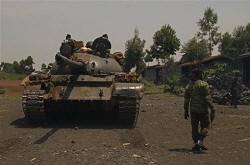 |
|

 Congo: Rocket lands in Goma, kills 3 in new attack
Congo: Rocket lands in Goma, kills 3 in new attack
[August 24, 2013]
GOMA, Congo (AP)
--
|
Scores of angry residents took to the streets of Goma in protest following several days of violence that has left at least seven dead and dozens wounded. Congo immediately blamed the attacks on neighboring Rwanda, which has long been accused of supporting the eastern Congolese rebel movement known as M23. "We wonder, for how long will the international community continue to tolerate these offenses?" Lambert Mende, a spokesman for the Congolese government, told The Associated Press. Rwanda, which has vigorously denied allegations by the United Nations and others that it has provided support to the M23 rebels fighting the Congolese government, also accused Congolese forces of attacking Rwanda. The Rwandan army said mortar fire landed in several villages along the border Friday afternoon. "The continued indiscriminate bombing of Rwandan villages by (Congolese) armed forces is unacceptable and must stop immediately," said Brig. Joseph Nzabamwita, a spokesman for Rwanda's military. The M23 rebel group briefly overtook Goma late last November and subsequent peace talks in neighboring Uganda have repeatedly stalled. M23's leaders previously headed other rebel groups in the region that were backed by Rwanda. On Friday, the U.N. and Congolese officials confirmed that the new U.N. intervention brigade had shelled rebel positions on Thursday for the first time since the force was created in March. Congolese army spokesman Col. Olivier Hamuli told The Associated Press that the fighting resumed around 5 a.m. Saturday and was continuing seven hours later. Mende, the Congolese government spokesman, said the U.N. brigade had provided logistical and other support. New mission chief Martin Kobler, the U.N. secretary-general's special representative in Congo, told journalists Friday that the U.N. brigade will protect Goma, a city of nearly a million people on the Congo-Rwanda border that was briefly overtaken by rebels in November. He said the U.N.'s objective in recent heavy fighting outside Goma was "to defend the town but also to eliminate the M23's positions." A U.N. official, who spoke on condition of anonymity because details of the U.N. operation have not been made public, had said that Thursday's mission was a defensive operation to protect civilians and U.N. bases -- not an offensive operation. The intervention brigade, consisting of Tanzanian, South African and Malawian soldiers, was created by the U.N. Security Council in March and has deployed to Congo over the past few months, reinforcing 17,000 U.N. blue helmets already with the mission. The brigade has a stronger mandate than past U.N. peacekeeping missions and is authorized to fight the rebel forces operating in eastern Congo. There has been widespread skepticism in Congo that the intervention brigade will be a game-changing addition to the existing U.N. force, which stood by when M23 fighters briefly captured Goma late last year. Mineral-rich eastern Congo has been destabilized by a myriad of armed groups since the aftermath of Rwanda's 1994 genocide when Hutu extremists blamed for the bloodshed fled into neighboring Congo. |


